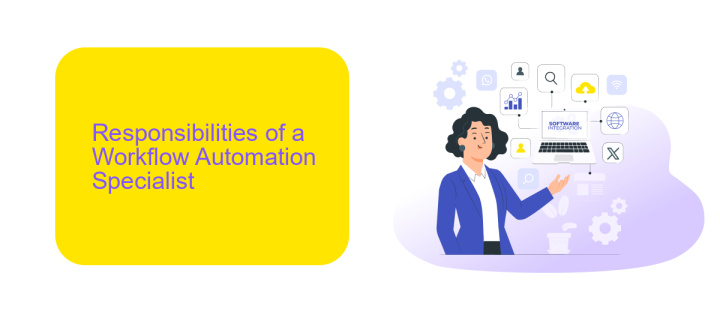Workflow Automation Specialist
In today's fast-paced business environment, the role of a Workflow Automation Specialist has become increasingly vital. These professionals streamline processes, enhance productivity, and reduce operational costs by implementing automated solutions. By leveraging cutting-edge technology, they ensure that businesses operate smoothly and efficiently, allowing teams to focus on strategic tasks rather than mundane, repetitive ones. Discover how a Workflow Automation Specialist can transform your organization.
Introduction to Workflow Automation
Workflow automation is a transformative approach that streamlines business processes by automating repetitive tasks and orchestrating workflows. By leveraging technology, organizations can enhance efficiency, reduce errors, and save valuable time, allowing employees to focus on more strategic activities.
- Automates repetitive tasks
- Reduces operational errors
- Enhances overall efficiency
- Frees up employee time for strategic activities
One of the key components of workflow automation is the integration of various software and tools. Services like ApiX-Drive facilitate seamless integration between different applications, enabling smooth data flow and process automation. By using such tools, businesses can ensure that their workflows are not only efficient but also interconnected, providing a holistic approach to automation.
Responsibilities of a Workflow Automation Specialist

A Workflow Automation Specialist is responsible for designing, developing, and implementing automated workflows to streamline business processes. They analyze existing workflows to identify inefficiencies and areas for improvement, ensuring that automated solutions are both effective and sustainable. This role involves collaborating with various departments to understand their needs and create tailored automation strategies that enhance productivity and reduce manual tasks.
Additionally, the specialist manages the integration of different software and tools to create seamless workflows. Utilizing platforms like ApiX-Drive, they can easily connect various applications, enabling data to flow smoothly between systems. They also monitor and maintain these automated processes, troubleshooting any issues that arise and making necessary adjustments to optimize performance. Continuous learning and staying updated with the latest automation technologies are crucial aspects of this role, ensuring that the organization remains competitive and efficient.
Skills and Qualifications for Workflow Automation Specialists

A Workflow Automation Specialist must possess a diverse skill set to effectively streamline processes and enhance productivity. They should have a solid understanding of business process management and be adept at identifying inefficiencies and areas for improvement. Strong analytical skills and attention to detail are crucial for evaluating workflow performance and implementing effective automation solutions.
- Proficiency in workflow automation tools and software, such as ApiX-Drive, for seamless integration of various applications and services.
- Knowledge of programming languages like Python, JavaScript, or SQL to customize and optimize automation scripts.
- Experience with data analysis and visualization tools to interpret and present workflow metrics.
- Strong project management skills to oversee automation projects from conception to completion.
- Excellent communication and collaboration abilities to work effectively with cross-functional teams and stakeholders.
In addition to technical skills, a Workflow Automation Specialist should be proactive and continuously seek opportunities to enhance processes. They must stay updated with the latest industry trends and technologies to ensure the organization remains competitive. Adaptability and problem-solving skills are essential to navigate the dynamic landscape of workflow automation.
Career Path for Workflow Automation Specialists

The career path for Workflow Automation Specialists is dynamic and multifaceted, offering numerous opportunities for growth and specialization. Initially, professionals often start in entry-level positions such as junior automation analysts or support specialists, where they gain hands-on experience with various automation tools and platforms.
As they advance, these specialists can move into roles such as automation engineers or integration specialists. In these positions, they focus on designing, implementing, and optimizing automated workflows, often using services like ApiX-Drive to streamline and integrate various business applications.
- Junior Automation Analyst
- Support Specialist
- Automation Engineer
- Integration Specialist
- Senior Workflow Automation Specialist
- Automation Consultant
Senior roles, such as senior workflow automation specialists or automation consultants, involve strategic planning and leadership responsibilities. These professionals oversee complex projects, mentor junior team members, and often collaborate with other departments to ensure seamless integration and efficiency across the organization. Continuous learning and staying updated with the latest automation technologies are crucial for long-term success in this field.
Challenges and Opportunities in Workflow Automation
Workflow automation specialists face numerous challenges, including the integration of disparate systems and ensuring seamless data flow across platforms. One common obstacle is the complexity of setting up and maintaining these integrations, which often require specialized knowledge and constant monitoring. Additionally, resistance to change from employees accustomed to manual processes can hinder the adoption of automated workflows, making it essential to provide adequate training and support.
Despite these challenges, there are significant opportunities in the field of workflow automation. Tools like ApiX-Drive simplify the integration process, allowing specialists to connect various applications without extensive coding knowledge. This not only accelerates the deployment of automation solutions but also reduces the likelihood of errors. Furthermore, the growing demand for efficiency and cost reduction in businesses creates a favorable environment for workflow automation specialists to showcase their expertise and drive organizational transformation.
FAQ
What is a Workflow Automation Specialist?
How can workflow automation benefit my business?
What types of tasks can be automated?
How do I get started with workflow automation?
What skills are needed to become a Workflow Automation Specialist?
Do you want to achieve your goals in business, career and life faster and better? Do it with ApiX-Drive – a tool that will remove a significant part of the routine from workflows and free up additional time to achieve your goals. Test the capabilities of Apix-Drive for free – see for yourself the effectiveness of the tool.

